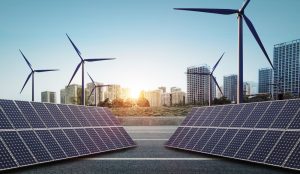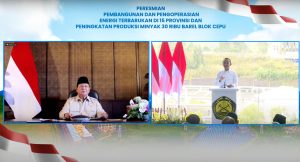Jakarta—Indonesia’s declining oil production in recent years has sparked serious concerns about its impact on the country’s finances. In one of his last speeches before the end of his term, on Friday, October 11, President Joko Widodo delivered a strong message to the next government to immediately address the nation’s declining oil production, also known as lifting.
“Oil lifting must increase by any means. We must productize existing wells, because once our oil production drops, the costs we have to spend on imports are getting bigger,” Jokowi said during the Mining and Energy Day celebration, quoted from the Ministry of Energy and Mineral Resources’ Youtube.
In a recent meeting, Finance Minister Sri Mulyani warned Jokowi about the huge risks the country could face if oil production declined. According to Sri Mulyani, the high cost of oil imports will further erode the country’s foreign exchange and burden the budget.
“Just this afternoon, the Minister of Finance told me: ‘Sir, our oil lifting cannot fall continuously. If even a small amount drops by 50-100 thousand barrels, our imports will soar, requiring hundreds of trillions of rupiah. Our foreign exchange will be drained’,” Jokowi quoted Sri Mulyani.
The President also emphasised that Indonesia’s main sources of oil, including from Pertamina and private companies, must be optimized. The government not only relies on Pertamina but also opens opportunities for private and foreign companies to assist in boosting national oil production.
“The important thing is that our production rises, whether it is state-owned enterprises, the private sector, or foreigners who work on it. Don’t let our lifting drop even a speck,” he added.
Indonesia’s oil production has decreased significantly compared to the previous decade. With domestic demand rising, this production deficit could lead to higher import dependence and pose a risk to national economic stability.
Experts in the energy sector also agree that increasing oil lifting is not easy. Komaidi Notonegoro, Executive Director of Reforminer Institute, stated that real steps are needed to increase exploration and investment in the energy sector.
“The government must encourage large investments in the energy sector to achieve higher oil lifting targets. By increasing lifting, we can reduce dependence on oil imports and strengthen national energy security,” Komaidi said.
Based on data from the Ministry of Energy and Mineral Resources (MEMR), Indonesia’s oil production is currently at around 700 thousand barrels per day, far below the ideal lifting target of around 1 million barrels per day. This situation makes Indonesia increasingly vulnerable to global oil price volatility.
Increasing oil production is one of the government’s top priorities to maintain energy security and balance the financial balance. According to President Jokowi, various efforts will be taken, including increasing exploration, optimizing old wells, and improving operational efficiency in national oil fields.
“That way, we will not continue to burden the state budget with the budget for oil imports, and our foreign exchange can still be maintained,” Jokowi concluded. (Hartatik)
Photo caption: President Joko Widodo delivers remarks at the Mining and Energy Day celebration broadcast live on the Ministry of Energy and Mineral Resources’ YouTube channel, Thursday (10/10). (Photo: screenshot of Ministry of Energy and Mineral Resources YouTube)














